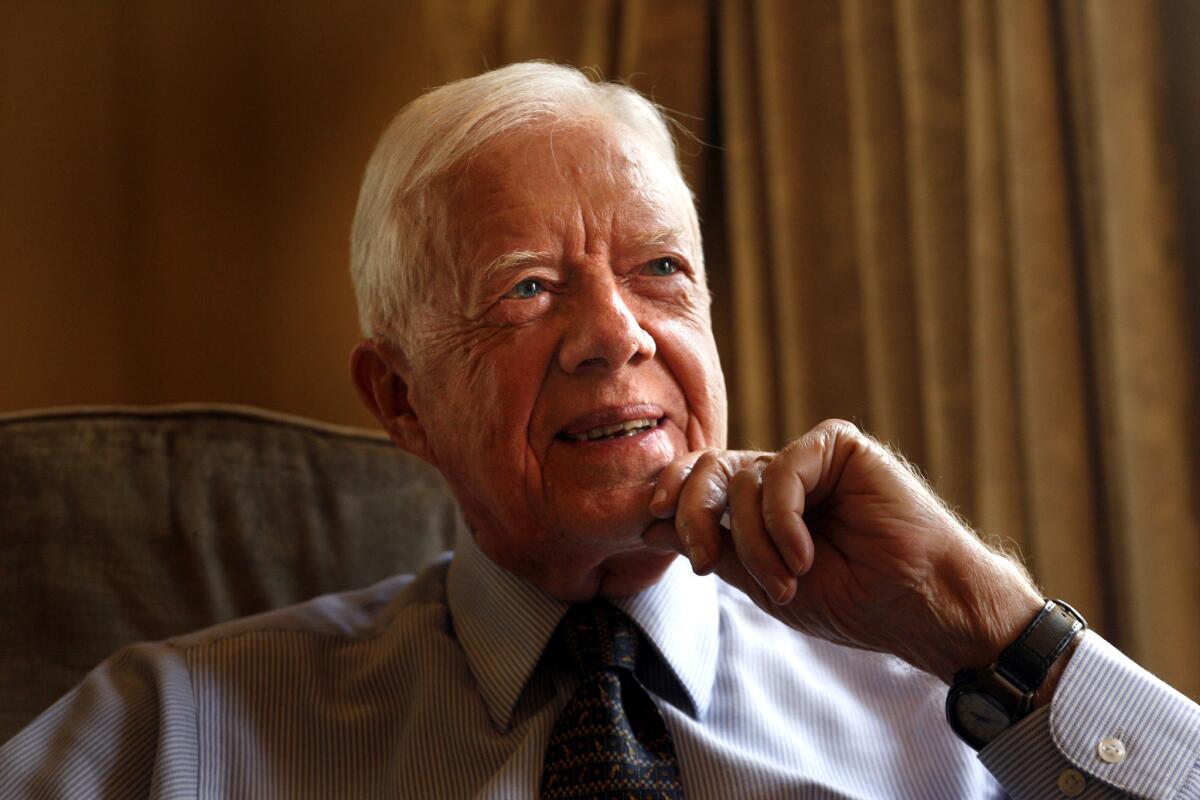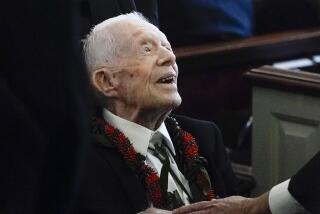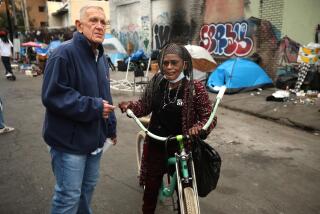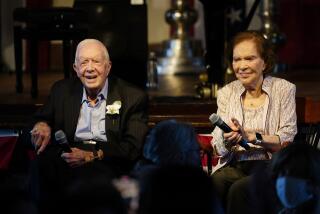Former President Jimmy Carter says he has cancer

Former President Jimmy Carter, shown in 2006, announced Wednesday that he has cancer.
Former President Jimmy Carter has cancer that has spread to multiple parts of his body, he announced Wednesday.
“I will be rearranging my schedule as necessary so I can undergo treatment by physicians at Emory Healthcare” in Atlanta, Carter said in a brief statement issued through his nonprofit, the Carter Center. “A more complete public statement will be made when facts are known, possibly next week.”
The cancer was discovered after an Aug. 3 surgery in Atlanta to remove a mass from the 39th president’s liver. The Carter Center said last week that the procedure had gone smoothly and that his prognosis for a full recovery had been “excellent.”
President Obama wished Carter well, in a statement and a phone call. “Michelle and I send our best wishes to President Carter for a fast and full recovery,” he said in the statement, adding that his thoughts and prayers were with Carter and his family. “Jimmy, you’re as resilient as they come, and along with the rest of America, we are rooting for you.”
Dr. Len Lichtenfeld, deputy chief medical officer of the American Cancer Society, said that “there’s a lot we don’t know” about Carter’s prognosis, and that his doctors would probably first work to determine where the cancer originated.
“Given the president’s age, any treatments, their potential and their impacts, will undoubtedly be discussed carefully with him and his family,” Lichtenfeld told the Associated Press.
Carter discussed his family’s extensive history of cancer in his recently released book, “A Full Life: Reflections at Ninety.”
Four of his family members — his father, his brother and two of his sisters — died of pancreatic cancer, prompting the National Institutes of Health to monitor Carter’s family, he wrote.
“There was no record of another American family having lost four members to this disease, and since that time I have had regular X-rays, CAT scans, or blood analyses, with hope of early detection if I develop the same symptoms,” Carter wrote. “By the time it is detected, cancer of the pancreas has often metastasized to other vital organs and is usually fatal within a few months.”
“Being the only nonsmoker in my family may have been what led to my longer life,” he suggested.
Carter, 90, has largely been in good health through his old age, traveling extensively for nonprofit work around the world. In May, he fell ill while in Guyana to observe elections there and had to cut his trip short.
The Democrat from Plains, Ga., whose full name is James Earl Carter Jr., is the second-oldest living president after George H.W. Bush, 91. Raised on a peanut farm, he was a relative unknown as Georgia governor when he launched his campaign to unseat President Ford in the 1976 election.
At the time, the nation was still reeling from the Watergate scandal, President Nixon’s resignation and Vietnam.
As a moderate Democrat and a standard-bearer for the more racially tolerant “new South,” Carter promised a government “as good and honest and decent and competent and compassionate as its people.”
At a meeting with editors of the Los Angeles Times in 1975, Carter said he planned to win the presidency partly by giving his candidacy an early boost by winning the Iowa caucuses. Until then, Iowa had been a bit player in the nominating process, mostly ignored by strategists. Carter’s eventual win in Iowa vaulted him to front-runner status — and Iowa into a major role in presidential nominations.
Carter’s signature achievements as president were primarily on the international front. They included the Camp David peace accords between Egypt and Israel, which he personally brokered and which have endured through more than three decades of strife in the Middle East.
At home, though, his presidency was buffeted by crises — rampant inflation, gas lines and high unemployment — as well as by his administration’s inability to win the release of 52 Americans held hostage in Iran for 444 days, the last 15 months of his term in office.
In 1982, Carter and his wife, Rosalynn, founded the Carter Center, which pressed for peaceful solutions to world conflicts, promoted human rights and helped work to eradicate disease in poor nations.
The center, based in Atlanta, launched a new phase of Carter’s public life that would earn him a Nobel Peace Prize in 2002.
“I am not here as a public official, but as a citizen of a troubled world who finds hope in a growing consensus that the generally accepted goals of society are peace, freedom, human rights, environmental quality, the alleviation of suffering, and the rule of law,” he said in his Nobel lecture in Oslo.
Last month, in an interview with The Times, Carter responded bluntly and with characteristic honesty when asked whether he thought the arc of the universe bent toward justice.
“I’m not sure about that,” Carter replied, suggesting that “violence and destruction and hatred and animosity and discrimination seem to me to be becoming more acceptable in some parts of the world.”
However, he said, “I try not to be critical of others who’ve done differently from me, but in a positive way spell out the things that might be done more effectively, more honestly, more beneficially to our own people and people in the rest of the world.”
His friendship with former South African leader and human rights icon Nelson Mandela was “one of the benefits of the life that I have,” Carter said. “That is, access to almost anyone in the world with whom I want to meet and discuss issues.”
Times staff writer Carolyn Kellogg contributed to this report.
ALSO IN THE NEWS
Column: What non-Californians don’t know about Carly Fiorina, but should
Huge L.A. turnout for Bernie Sanders campaign rally: ‘Feel the Bern!’
Massive explosion in northern China kills seven people, injures hundreds
More to Read
Sign up for Essential California
The most important California stories and recommendations in your inbox every morning.
You may occasionally receive promotional content from the Los Angeles Times.












